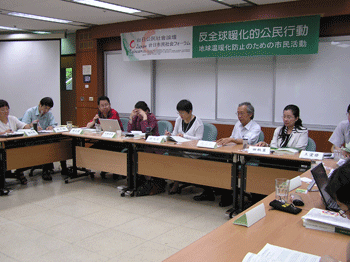I was invited to attend the Taiwan-Japan Civil Society Forum, held in Taiwan on June 16-17. The forum addressed the question of how to build grassroots networks. It was sponsored by the Taiwan Environmental Protection Union and eight other groups and was supported financially by the Taiwanese government (Ministry of Foreign Affairs, Ministry of the Interior, Ministry of Education, etc.). Cooperating organizations included the Association of East Asia Relations and Interchange Association Japan (which acts like an embassy). The main organizer on the Japan side was the Waseda University Research Institute of Taiwan.
Based on a recognition of the importance and potential of the role of NGOs in the public spaces within the activities of government and industry and in citizens' daily lives, the objective of the meeting was to activate networking and interchange between NGOs of both countries. The meeting brought together 26 groups from both countries working on a wide range of issues, including environmental protection, AIDS, children's rights, education, aged care, the constitution and young people's issues.
 |
|
Participants in global warming working group
|
On the second day we broke up into six working groups. I joined the first working group, which dealt with citizens' action in response to global warming. In my presentation I pointed out that nuclear energy drives up electricity consumption and hence increases CO2 emissions. Like the Japanese government, Taiwan's national electric power company, Taipower, touts nuclear energy as an effective response to global warming. Taiwanese delegates explained that this was a public relations stunt to justify construction of Taiwan's highly contentious fourth nuclear power plant. Both Japan and Taiwan are very earthquake-prone countries. From the discussion in this working group, I discovered that, like Japanese NGOs, Taiwanese NGOs are very concerned about the ability of nuclear power plants to withstand earthquakes.
This time I was on a very tight schedule, so I did not have time to visit Taiwan's No. 4 power plant. It was reported that new funding has been made available and that construction is continuing. However, I was told that it is only about 60% complete. The policy of the ruling Democratic Progressive Party is to continue construction of the two Taiwan No. 4 reactors (both ABWRs exported by Japanese companies), but not to build any more reactors after that and to gradually phase-out nuclear power. There are hopes of enacting a nuclear phase-out law, but unfortunately, as long as the Nationalist Party has a majority in the Legislative Yuan (Taiwanese parliament), draft legislation will not be submitted.
In regard to global warming, all participating NGOs agreed on the need to create a low-carbon society. We exchanged ideas about concrete examples of initiatives being taken. After the meeting ended, I was told that Taiwan's electric power system has distribution losses of 17%. Fixing this problem is a major issue. The reason why no progress is being made is that, because of its monopoly position, Taipower has no incentive to do anything about it.
Because Taiwan is not a member of the United Nations, the terms of the Kyoto Protocol do not apply to it. Hence, even if it reduces its CO2 emissions this will not receive any international recognition. This dilemma reflects the international context in which Taiwan is placed. Nevertheless, the head of the Taiwan Environmental Protection Administration said that it was highly significant that CO2 emissions reduction was included as an important issue on the agenda of an economically sustainable development conference last year.

